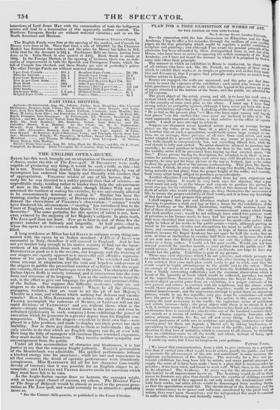THE ENGLISH OPERA-HOUSE.
BALI% huts this week brought out an adaptation of DinsezErres L'Eliwir d'Amore, under the title of The Love-spell. If DONIZEWI were really capable of producing any thing, it would be such a trifle as this—but he is not. Nature having denied him the inventive faculty, by way of recompense has endowed him largely and liberally with another, that of appropriation. FIELDING relates of one of his heroes, that " in early life he was directed to a nobler pursuit than that of science,—an unprofitable study, tending rather to hinder than help the advancement of men in the world : but (he adds) though Master Wild was not esteemed the readiest at making his exercise, he was universally- allowed to be consummately dextrous at stealing it." Similar has been the training, similar the propensity, of DONIZETTI ; and his Career has evi- denced the shrewdness of FIELDING'S observation : " science" would have hindered his advancement—" stealing" has introduced hint to the Court of England, and rendered him Queen VICTORIA'S prime musical favourite.* The same partiality for this species of talent is not, how- ever, evinced by the majority of her Majesty's subjects. In plain truth, The Love-spell does not draw. Few go to hear it, and of those few the greater number sit listlessly and languidly. At half price—that is, when the opera is over—crowds rush in and the pit and galleries are filled.
A long residence at Milan has led Ilm.rE to estimate every thing con-
nected with the opera by an Italian standard : d'Awore was successful in Italy, therefore it will succeed in England. And he has not yet resided long enough in his native country to find out the incor- rectness of his conclusion from such premises. Were the music of DONIZETTI as good as it is the reverse, our language and the training of our singers are equally opposed to it successful and effective represen- tation of his opera upon the English stage. The wretched and ludi- crous attempt at adaptation, and the vain and hopeless endeavours of the singers to gabble the prescribed number of' syllables with the requi- site velocity, throw an air of burlesque over the piece. The character of the Italian Opera Buffet is strictly national, and is interwoven into the very forest and structure of its language. Vain as the endeavour to bend the oak, is the effort to give our language the pliability and pronunciability of the Italian. But suppose this difficulty overcome, what are our singers to do with DoNizern's music? Where be all the divisions, arpeggios, roulades, that are wont to set the pit of her Majesty's Theatre in a roar, and without which nothing but dulness and vacuity remain ? How is Miss RAINFoterit to achieve the style of PERSIANI FRASER accomplish the cadenzas of Roam, or LEFFLER roll out the rapid divisions of TAMBURINI? and yet, without these, what is the music—simply nothing. BALFE stood alone in the piece; and even he refrained (judiciously in such company) front exhibiting the power of execution which he possesses in a greater degree than his English con- temporaries. Thus, all the singers—excellent in their own line—were placed in a false position, and made to display not their .power but their inability. Nor is there any discredit to theta as indiveduals : they are only unable to do that which no English singers can do or ever will. How long the folly of managers will continue these wretclied exposures, they must decide for themselves. They receive neither sympathy nor encouragement front the public. Under all this accumulation of obstacles and hindrances, it is but justice to say that the company fought gallantly. Bit.FleS personation of the Mountebank -was admirable. His spirited performance infused a kindred energy into his associates ; while his tact and experience iu all that concerns the detail of operatic performance were abundantly conspicuous. Miss RAINFORTH did all for her character (one totally devoid of interest) that it was possible for an English singer to ac- complish; and LEFFLER and FRASER deserve credit for exertions which they must have felt to be vain.
As the Anglo-Italian operas draw no hearers, the manager might,
with at least equal chance of success, try others. The Haunted Tower or The Siege of' Belgrade would be almost as novel to the present gene- ration as The Love-spell, and would certainly be as attractive—probably more so.
* See the Concert-bills passim, as published in the Court Circular.


























 Previous page
Previous page